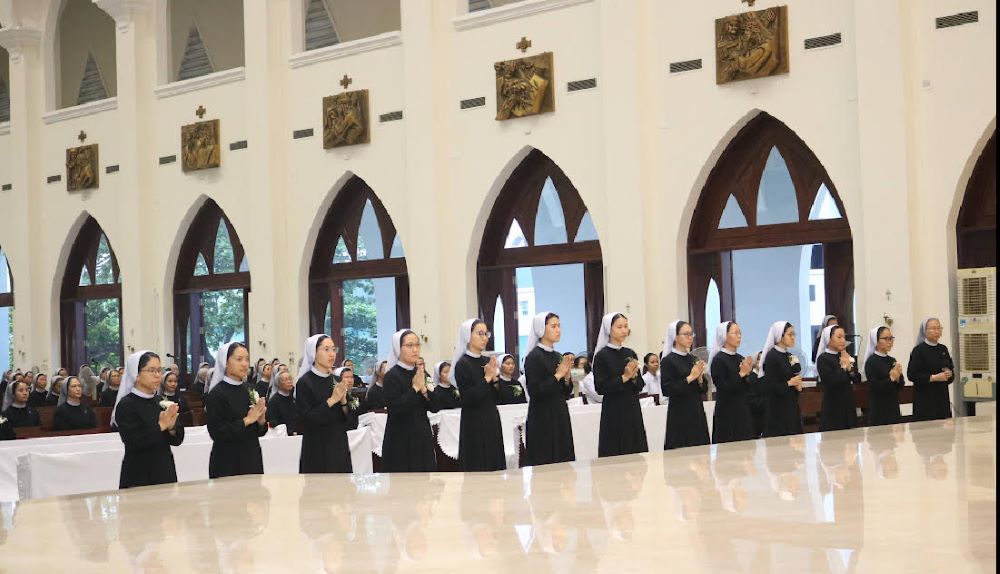
Twelve Sisters of Mary, Queen of the World, in Vietnam make their first profession in 2024. The congregation's charism of evangelical spiritual childhood, is rooted in the Gospel message, "Unless you turn and become like little children, you will not enter the kingdom of heaven." (Courtesy of Maria Yen Do)
From the moment sisters embrace their calling, their congregation's charism shapes every part of their lives. But how does this spiritual gift influence our everyday interactions, both at work and at home? This month, our panel considers the question:
How does your charism influence the ways in which you interact with others?
_____

Charity Bbalo, a Religious Sister of the Holy Spirit from Zambia, serves as principal in a girls' high school in southern Zambia. Before she was missioned to the high school, she served as a lecturer in a teacher training college. She is passionate about researching issues related to religious life, women and the girl-child. She enjoys writing as well as reading novels and academic articles.
When I was a novice, each time I was asked about the charism of my religious congregation, I quickly repeated a statement I had memorized from our constitutions: "Our dedication and openness to the personal action of the Spirit continuing Christ's mission — this is our charism." However, over the years, I have become more aware that for the charism to come to life, it has to be consciously lived in my day-to-day activities.
As principal of a girls' high school, living out the core values of my religious congregation is one practical way I express the charism of the Religious Sisters of the Holy Spirit. I aim to be the best educator I can by consciously practicing the values of simplicity, integrity, humility and forgiveness. In every situation, I ask myself, "What is the Spirit saying?" For example, when I feel inclined to judge a student without first hearing out why she continually flouts school rules, I try to remind myself that the Spirit is asking me to reach out to that student and see how best I can help her.
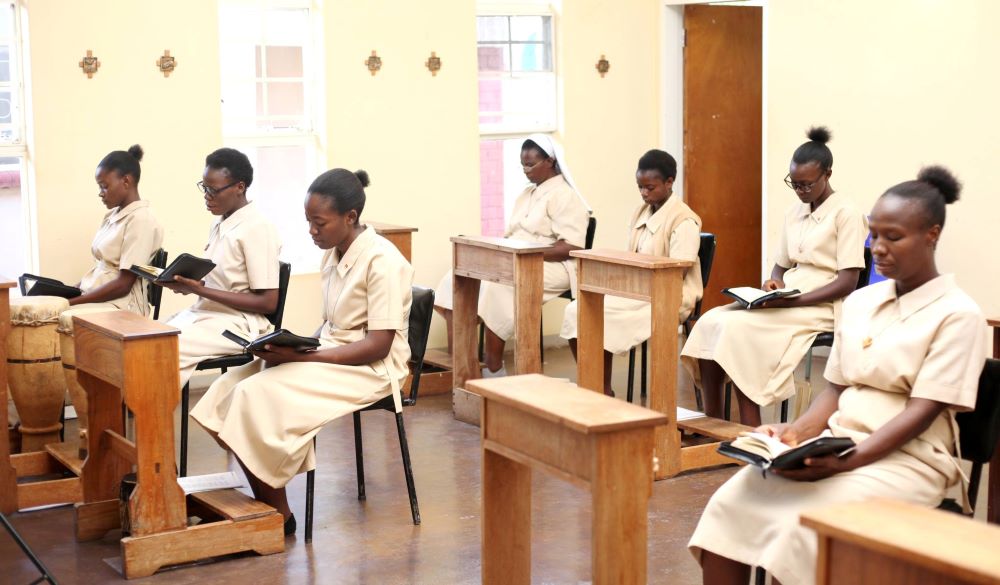
Novices of the Religious Sisters of the Holy Spirit learn about novitiate life and vocations in Chikuni Mission, Monze Diocese, Zambia. For the congregation's charism to come to life, "it has to be consciously lived in my day-to-day activities," says Sr. Charity Bbalo. (Courtesy of Religious Sisters of the Holy Spirit)
Through a simple lifestyle, influenced by the life of our founder, who was known for his simplicity despite being bishop, I make an effort to be more approachable and to listen to my students' concerns, no matter how trivial they may seem. This is done with the understanding that every person has an innate dignity as a child of God. Therefore, each person deserves to be listened to and made to feel that they matter.
Further, I try to consciously live out the fruits of the Holy Spirit in my daily interactions with others. Each week, I choose one of the fruits or gifts of the Spirit and make an effort to express it in a concrete way. Before retiring for the night, I use the Ignatian Examen to reflect on how I lived out a particular fruit or gift of the Spirit. This practice has helped me to be more conscious of the ways in which the Spirit is at work in my life and in the lives of others. These practical ways of consciously living out the charism have helped me make the charism of my religious congregation move from being a mere religious statement to a way of life that I hope others will also feel drawn to practice.

Margaret Kerry, a Daughter of St. Paul, served as director of the Pauline lay Association of Pauline Cooperators for 15 years. For most of her 45 years of religious life, she was missioned to Pauline Book & Media Centers, serving as volunteer coordinator, outreach coordinator, manager and superior. For six years she served in the provincial government as councilor for the apostolate. Her studies were in organizational development at DePaul in Chicago and a master's in pastoral theology and ministry at Boston College School of Theology and Ministry. During studies, she initiated inner-city reading rooms for afterschool programs in collaboration with the Volunteers of America (New Orleans) and the Boys and Girls Club (Chicago) and began a reading program at Horizons for Homeless Children (Boston).

Sr. Margaret Kerry, a Daughter of St. Paul, and another sister are photographed by a beachcomber in South Carolina. "The Pauline charism, deeply rooted in eucharistic devotion and a love for the Scriptures, leads me to a closer union with Jesus Christ," Kerry says. (Courtesy of Daughters of St. Paul)
As a Daughter of St. Paul, I am committed to presenting Jesus as the Way, the Truth and the Life to the world using the most effective means, such as media, which is a powerful cultural influencer that reaches the masses. My charism encourages me to embrace traditional and innovative technology while emphasizing the importance of human connections and personal witness in sharing the Gospel.
My daily life is sanctified by our charism, which influences my decisions through prayer, Scripture, the Eucharist and Christ's paschal mystery. The Pauline charism, deeply rooted in eucharistic devotion and a love for the Scriptures, leads me to a closer union with Jesus Christ. It urges me to remain open-minded and stand in solidarity with others, reframing my fear of the other into an embrace of God's universal love. The legacy of our founder, Blessed James Alberione, inspires love and respect for the teachings of the church, the papacy and the ordained priesthood, urging us to realize the gift of our Pauline priestly mission saying that a priestly heart and soul is necessary. "What are you?" he asked the Daughters of St. Paul, "I would say deaconesses, priestesses! In the way that we talk of Mary."
Our charism encourages my continual conversion and integration of mind, will and heart in a changing world. In my discernment, I follow "four wheels" that balance out my life: poverty, prayer, mission and study. Additionally, the charism continually reminds me to prioritize concern for the marginalized and to guard against consumerism, individualism and nationalism.
The charism redefines the way I view my role in bringing about the kingdom of God, instilling the belief that even the smallest contributions make God's love known. Dialogue with Christians and non-Christians is also key to promoting unity and collaboration.
Our charism encourages my continual conversion and integration of mind, will and heart in a changing world.
The Pauline charism shapes my spiritual life and mission, guiding my actions, decisions and interactions with others. It instills in me a deep sense of purpose and meaning, reinforcing the importance of embracing modern technology for the Gospel, fostering dialogue and collaboration, and response to Catholic social teaching and the marginalized in our world today.
The words that embody the charism for me are the words of Jesus on the sanctuary walls in each of our chapels: "Do not fear; I am with you. From here I will enlighten. Live with a penitent heart." These words remind me of God's indwelling Spirit, leading me to trust God's promises and rely on God's mercy as I invite others to know how much they are loved. As Paul's charism became Scripture so I am called to become a living word for the church so that it is "no longer I that live, but Christ lives in me" (Galatians 2:20) and "through the church the manifold wisdom of God may be made known" (Ephesians 3:10).

Maria Yen Do is a member of the Sisters of Mary, Queen of the World in Vietnam. She has been working for years as a catechist and kindergarten teacher and serving as an organist and choir director in various faith communities. She previously taught English to novices and catechism to postulants in her community. She came to the United States to pursue higher education and is currently working toward a doctorate in religious education. Upon completing her studies, she hopes to serve her community and the church in Vietnam.
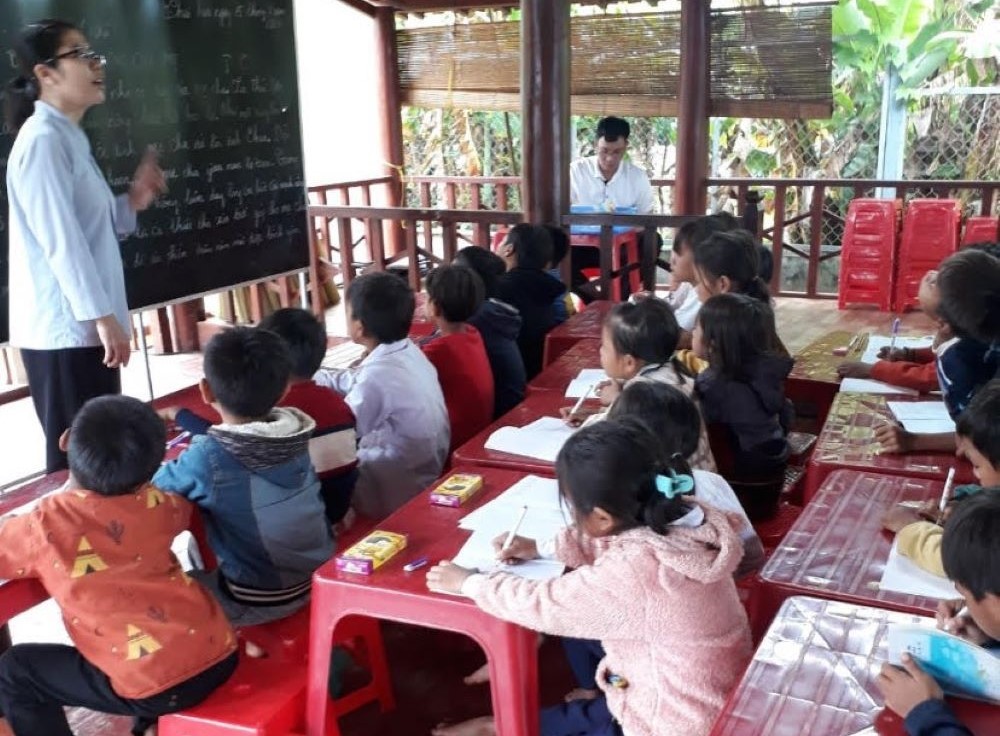
Sisters of Mary, Queen of the World, in Vietnam provide additional support to first-grade students in a classroom. The congregation's charism invites the sisters to embrace simplicity and humility in interactions with others. (Courtesy of Maria Yen Do)
Our community, the sisters of Mary, Queen of the World, embodies the charism of evangelical spiritual childhood. Our spiritual life is rooted in the Gospel message, "Unless you turn and become like little children, you will not enter the Kingdom of heaven" (Matthew 18:3). We model our lives after Jesus in his childhood, striving to live as little children of our heavenly father and Mary. This charism invites us to embrace simplicity and humility in our interactions with others and to place our full confidence in God's providence in all aspects of our lives.
As we grow up, life often becomes more complicated. The charism of evangelical spiritual childhood encourages us to embrace simplicity amidst the complexities of life. It influences us to live simply in our manner of dressing, speaking, and behaving. We wear gray blouses for casual attire and black dresses for liturgical celebrations and formal occasions. Within our community, we address one another as sisters, sharing meals and participating in activities without distinction of class or position.
This simplicity also shapes our ministry, infusing our work with a joyful spirit. Those who interact with the Sisters of Mary, Queen of the World, often note the unique joy with which we carry out our apostolic work. Our primary focus is on the education of young children, as well as involvement in religious education, parish ministry and social charity. Regardless of the task, we approach it with filial love for God and a joyful attitude.
(Our) unwavering trust in God enables us to serve others selflessly and wholeheartedly, without expecting anything in return.
Humility is another key aspect of our spirituality. We listen humbly to the opinions and feedback of others, recognizing that God can speak and guide us through them, including the young children we serve. Embracing evangelical spiritual childhood does not mean being childish or passive; rather, it encourages us to mature spiritually and live each day actively. Our aim is to decrease our own importance so that God may become more prominent in our lives. We are willing to be corrected in order to become better people.
Above all, evangelical spiritual childhood empowers us to be strong witnesses of faith. We hold a deep belief that, like children who rely on their parents, God's providence will meet our needs. This unwavering trust in God enables us to serve others selflessly and wholeheartedly, without expecting anything in return. It also allows us to be hospitable to others, particularly the poor and the least. We care for them because we are cared for by God.
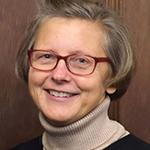
A Benedictine Sister of Chicago since 1988, Susan Quaintance currently serves as her community's subprioress; she also works part time as director of Heart to Heart, a ministry for seniors at a nearby parish. Classrooms are where she most feels most at home, having spent decades teaching in a Benedictine single-gender high school for young women and then directing an educational outreach program for older adults in downtown Chicago. She sits on the board of the United States Secretariate of the Alliance for International Monasticism and on the council of the Monastic Congregation of St. Scholastica.

St. Benedict delivers his Rule to St. Maurus and other monks of his order in this 12th-century artwork at the Monastery of St. Gilles, France. (Wikimedia Commons/Public domain/GDK)
One of the choicest blessings of my life was my 23-year tenure teaching at St. Scholastica Academy, the all-women's high school sponsored by my community. In school, we talked a great deal about the Benedictine charism: what it was, why it was important, what it looked and sounded like "in real life." In many ways that was my training ground for what came next, the jobs I've had since our school closed.
Here are three ways in which the values articulated in the Rule of Benedict have shaped who and how I am in the world.
Benedict says: "All guests who present themselves are to be welcomed as Christ." Whether it was a caregiver at the home health agency where I worked, or a new participant in the outreach program for older adults which I coordinated, or someone coming to visit our monastery where I am now subprioress, I wanted — and still want — to welcome that person as Christ. A brief summer in east Africa presenting workshops on monastic themes taught me powerful lessons about how vulnerable and powerless one can feel as a guest. Benedict understood that and spends a whole chapter teaching how to mitigate that experience. That instruction daily informs how I approach those I encounter at work.
Showing "the greatest patience" when people are not at their best, when I am frustrated by others' human imperfections — that is where the rubber hits the road.
Benedict says: "As often as anything important is to be done in the monastery, the prioress shall call the whole community together and explain what the business is; and after hearing the advice of the sisters, let her ponder it and follow what she judges the wiser course." A lifetime of attending monastic chapter and house meetings, during which this value is practiced, has made me someone who roots herself in the power of collaborative decision-making. When leading a program or department, it is mightily tempting to do what I think best or what is so clearly (to me) "right." But this life has taught me that my perspective is one among many and that groups travel forward most harmoniously if they have discerned the path together.
Benedict says that monastic should foster good zeal by ". . . supporting with the greatest patience one another's weaknesses of body or behavior." This is the only place in the Rule that Benedict uses the superlative of pati (the Latin root of the English "patience"). Showing "the greatest patience" when people are not at their best, when I am frustrated by others' human imperfections — that is where the rubber hits the road. As the sisters in my community grow frailer and more dependent, I confront this teaching daily. Confession: I'm not there yet. But I'm working on it.
None of this seems earth-shattering. For me, though, that's the gift of our foundational document and charism. It is "a little rule written for beginners" and I am a beginner every day.
Advertisement
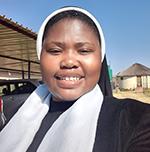
Agnes Motake, of Lesotho, is a member of the congregation of the Sisters of Holy Names of Jesus and Mary in Lesotho province. She joined the community in 2014 and professed her final vows in 2022. She has worked in ministries including teaching preschool and computer at SNJM College and working as a secretary at Holy Names High School. Currently she is a third-year university student, studying for a bachelor's degree in education.
The charism of the Sisters of the Holy Names of Jesus and Mary profoundly influences how I interact with others, both at work and at home. Founded in 1843 by Blessed Marie-Rose Durocher in Quebec, Canada, our congregation is devoted to the education and empowerment of women and girls, also, rooted in the belief that all people are made in the image and likeness of God and deserve dignity and respect. Our charism states that, "In fidelity to the spirit of our Foundress, we are a community of women religious consecrated to God, in the names of Jesus and Mary, who desire to proclaim by our lives the primacy of the love of God. Moved by an active love, we collaborate in the Church's mission of education with emphasis on education in the Faith and with a special concern for the poor and disadvantaged."
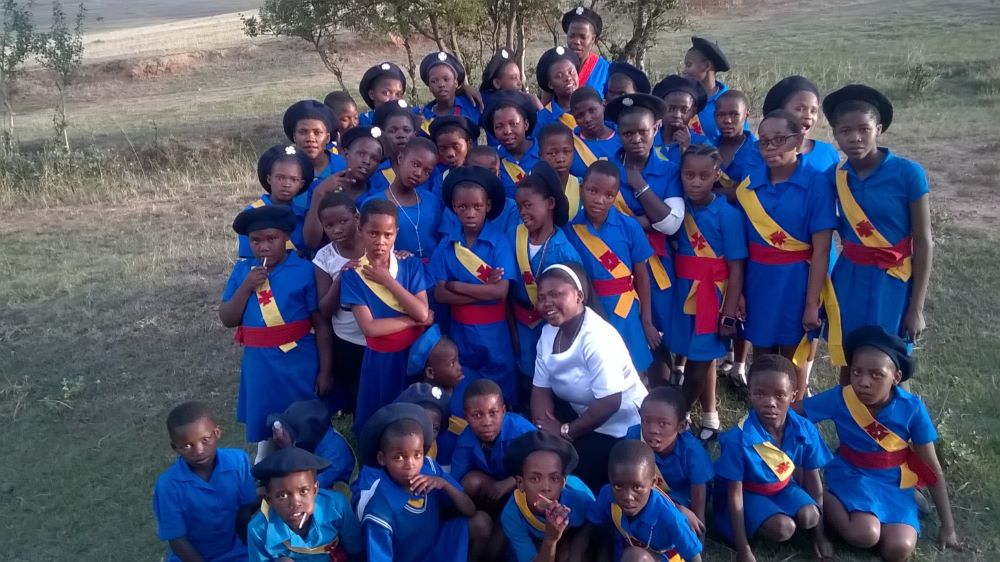
Sr. Agnes Motake, of the Sisters of Holy Names of Jesus and Mary, is seen with children in the group Soldiers of Christ the King ("Masolenyane a Kriste Morena") in Lesotho. Education is at the heart of the congregation's charism. (Agnes Motake)
Education is at the heart of our charism. In my pastoral duties as a preschool teacher and leader of different solidarities in the church, such as Masolenyane a Kriste Morena (Soldiers of Christ the King), I am guided by our charism, so I interact with others with respect and love. This approach fosters a positive and supportive environment where everyone feels valued. My belief in the power of continuous learning encourages those around me to develop their skills and knowledge, enabling them to contribute positively to the world.
Moreover, our charism promotes a sense of community and collaboration. This shapes how I interact with people in my current mission as a student-sister at the National University of Lesotho and with my community members at home. I strive to be empathetic, showing understanding and sensitivity to others' feelings and perspectives, creating a safe and welcoming environment. This spirit of teamwork and cooperation, rooted in our charism, leads to stronger relationships and a more harmonious work and home life.
My congregation's charism deeply impacts how I interact with others. Guided by the values of social justice, equality and compassion, I seek to build relationships based on empathy, understanding, and genuine concern for others. By following in the footsteps of our founder, Blessed Marie-Rose Durocher, I continue to uphold our charism's values and strive to make a positive impact in the world.








